SEO predictions are a New Years tradition, like the New Years Kiss, or the annual January 1st hangover.
Every SEO, digital marketer, and tech enthusiast has a prediction. Some are very wrong. Others are so vague, they can’t be disproven. Whether they’re good, bad, or unclear, annual SEO predictions are all the rage because web traffic has a huge effect on your bottom line.
This year, I’ve done something a little different. My 2019 SEO predictions will be paired with my graded 2018 predictions. That’s right: I’m giving myself a report card for last year’s predictions, with a bit of analysis, supported by data from 2018.
My SEO Predictions for 2019
1. Amazon will take a significant portion of search from Google.
By March of 2018, Amazon surpassed Alphabet (Google’s parent company) in stock price. Though Google has maintained its monopoly status, with somewhere around 90% of the search market, Amazon will take a larger portion of the search in 2019.
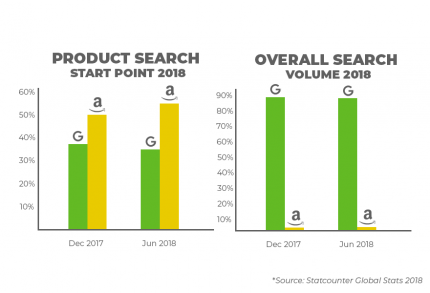
People use Google and Amazon for very different reasons. If your small business is dedicated to a skill or service, Google is the way to go. If you have an e-commerce website, or own a shop where your products are ordered and distributed, you may want to start selling your products on Amazon.
Google is a site for discovery, Amazon is a place for shopping. If you think you could benefit from the uptick in Amazon search volume, I’d recommend setting up an Amazon shop.
What You Can Do About Amazon’s Bigger Share:
Expand your business into an Amazon e-commerce shop, if you can. Learn how to optimize your amazon shop, so customers find your products as fast as possible!
2. Search Results will streamline as Voice Search goes fully mainstream.
Way back in the early 2000’s, the Google Search Engine Results page was 10 blue links, for everything, forever. It didn’t matter if you were searching for a local business, cat photos, or you’re trying to figure out that character actor’s name (you know, that guy who’s in everything!).
It was minimalist. It was predictable. It was clean.
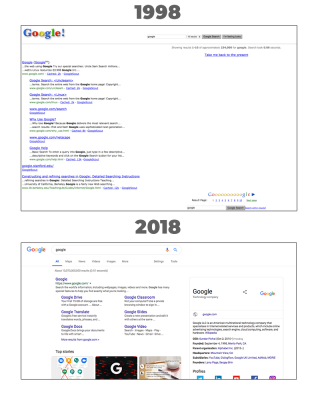
Around 2010, the mass adoption of smartphones changed the nature of the internet. Everything became more bite-sized and palatable. Google adapted its SERP with featured snippets, knowledge graphs, local packs, ads, and those blue links sank further and further down the page.
SEOs and digital marketers are still pretty mad about it.
Voice search, digital assistants, and the internet of things has further streamlined search results. When you ask Alexa what temperature it is outside, she won’t slog through ten blue links’ worth of information. She’ll give you a handful of words that summarizes the most authoritative answer. This “One True Answer” philosophy is troubling (for SEOs and the concept of truth itself), but it’s the direction the winds of tech are blowing.
The next year will be a further simplification-through-complication on the SERP, as voice and image search gets more popular.
What you can do about the streamlining of the SERP:
Optimize your site and content for the featured snippet. Address common questions and answers with plain, instructional language. Gain authority with link-building, great user experience, and engagement, and your content may just become the One True Answer the Home Assistant proclaims!
3. Fake Reviews, news, and users will carry less weight.
2018 was the year of mass fakeness. “Fake news” became a polarizing political phrase, 83 million Facebook users turned out to be fake, and entire careers are dedicated to spamming Amazon products with fake reviews.
On top of that, fake science and unsubstantiated conspiracy theories have become widespread. Our society can’t even agree on the basic facts. Chaos is the result.
In 2018, tech companies cracked down on hate groups, wild conspiracies, and pseudoscience. Google launched the Google News Lab in 2015, which became the Google News Initiative in 2018, and uses data to dampen and combat fake news.
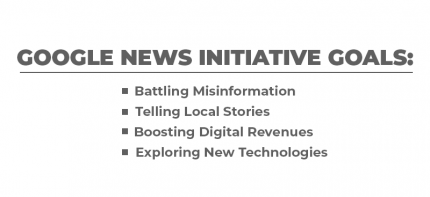
You can bet that RankBrain (which I mentioned in last year’s prediction blog!) will be observing user behavior, identifying more fake reviewer behaviors, and adapting to discourage, dampen, and remove fake reviews.
It certainly won’t happen overnight, and it will be far from perfect, but tech companies will turn the tide against online fakeness. 2019 will showcase the rise of realness, and the downfall of fakes.
What you can do about fake reviews, news, and users:
If a review, user, or news article is very obviously fake, you can report it. It will be up to the platform to vet and (maybe) remove it, but at least you contributed to online authenticity! Learn the warning signs of fakeness in all online materials, and always consider the source material when regarding anything online.
4. Less Clicks on SERPs (That isn’t a reason to neglect your SEO)
As mentioned before, the SERP ain’t what it used to be.
Featured snippets, ads, knowledge graphs, local packs, and who-knows-what-else will continue to overtake the prime real estate on the SERP.
According to Rand Fishkin, over 61% of mobile searches result in no click at all.
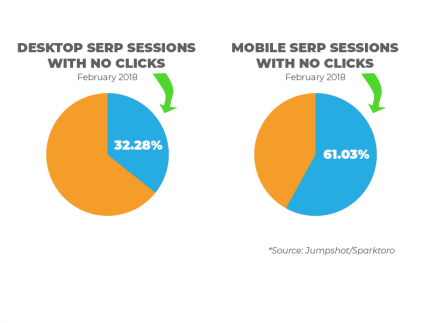
Users are scanning the search results, getting their answers, and moving on without even looking at your content. Content creators, who have worked very hard to provide Google with quality content over the years, have been deprived of their precious clicks and engagement.
This is disheartening, but it doesn’t mean you should give up on SEO services altogether. Every time Google presents a seemingly chaotic challenge, there are always ways to get the competitive edge.
What you can do about the reduction in clicks on SERPs:
Instead of giving up, pivot your strategy in 2019. If you’ve relied on organic rankings, consider paid media to get your site and content to the top of the SERP. It may be cheaper than you think! Work longer and harder on quality content, with images, links, embedded video, and common questions and answers that would be a great fit for the featured snippet. Step up your social media strategy to develop a community, and attract the right customers. If your content, site structure, and user experience are high-quality and innovative, you’ll rise above the competition.
5. Google My Business profiles will get more robust, and will become an even bigger ranking factor.
SEOs are in agreement about Google My Business: it’s more important than anyone would’ve thought. Well, almost anyone.
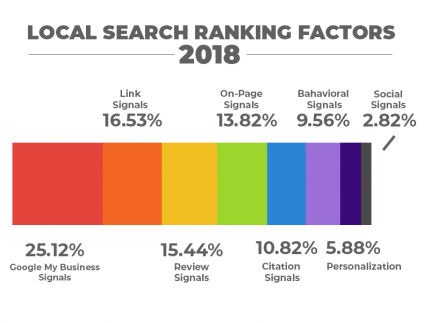
In Moz’s 2018 Local Search Ranking Factors blog, they found that Google My Business has a bigger impact on local rankings that links, reviews, on-page factors, personalization, or social media factors. Businesses with rockstar Google My Business profiles had a huge advantage over the competition.
The incorporation of video, Google posts, and Google Questions & Answers in the past few years shows that Google is expanding GMB. Also, the Google+ shutdown means Google will probably integrate much of the social and community aspects of G+ into GMB.
Don’t think of GMB listing as a replacement for your website. Even if it gets more interaction and views on the SERP, it is a separate entity that works in tandem with your local SEO.
How Small Businesses can prepare for 2019’s SEO:
- Take advantage of Amazon (if it’s right for your business), and optimize for other sources of search traffic.
- Make content that anticipates how people use voice search, and make address common questions and answers to get your content into the Featured Snippet.
- Report fake users and reviews.
- Focus on making higher-quality content than ever, across platforms.
- Take advantage of all new Google My Business features, and make sure your listing is optimized.
- Never lose faith in links and reviews as ranking factors.
My SEO Predictions for 2018, Graded.
As promised, I will address 2018’s SEO predictions with as much honesty as possible. It’s been a year of great consequence, with a great amount of volatility. Here’s how I did with my predictions:
1. SEO Will Get More Difficult: C
Last year, I made the claim that SEO will get more difficult. My reasoning: many expert SEOs are leaving the field, and the sophistication of Google’s algorithm has made it harder to be a dedicated SEO professional.
This is generally true, in the same way that I could’ve said, “The Google Algorithm Changes Sometimes.” What’s missing from my prediction is the multi-faceted nature of search. Just as tons of online factors contribute to SEO, SEO is cooked into just about everything on the internet. Being an SEO means knowing the best practices and optimizations for a rapidly-expanding set of factors and platforms. SEO is no longer one professional’s responsibility in an organization; everyone in an organization must take at least partial ownership of an organization’s SEO.
That said, the core values of Google haven’t changed. Good content, authoritative linking, positive reviews, clean site structure, and ethical business practices are still the backbone of good SEO. RankBrain’s emphasis on user behavior mostly rewards content that would do well, before RankBrain.
I was sort of right and sort of wrong.
2. RankBrain is Huge, and Getting Huger: Inconclusive
It was big news when Google announced that RankBrain is Google’s third-largest ranking factor.
Since then, the machine-learning part of the Google algorithm has integrated more fully into the core algorithm. Its user behavior metrics like dwell time, bounce rate, click-through rate, and anticipation could have led to streamlining of the SERP. It has integrated so completely into the Google Algorithm that it’s almost impossible to divorce the two for a controlled experiment.
There are hundreds of Google ranking factors, and dozens are related to user behavior. Most of these behavioral factors were in place long before RankBrain. We can safely assume it’s a huge part of ranking, but it’s hard to prove definitively what effect it’s had in 2018.
Shame on me for making a vague prediction!
3.Voice Search Expansion & Mobile Index Launch: A
Nailed it!
Voice search has definitely become way more popular, and the mobile index finally launched.
Enough said!
4.The Nature of Ranking Will Change: C+
This is a complicated one. Though organic ranking has definitely changed, with organic results sinking further down the SERP, there are still tremendous advantages to being the #1 result for relevant queries. For example, higher ranking results have a much higher chance of being included in the featured snippet, or earning a great linkback.
Ranking #1 in organic is still a great place to be, but not as great as it was before the SERP changed.
I got it semi-correct.
5. Content Experience Will Get More Important: B
Generally true. Also vague.
In 2018, I certainly stressed the importance of video, visual, engagement, and user behavioral queues. Though I stand by these claims, I may have overstated their importance. An authoritative all-text blog can perform very, very well.
I got it right, but overstated it. Maybe I was just excited about more immersive content!










